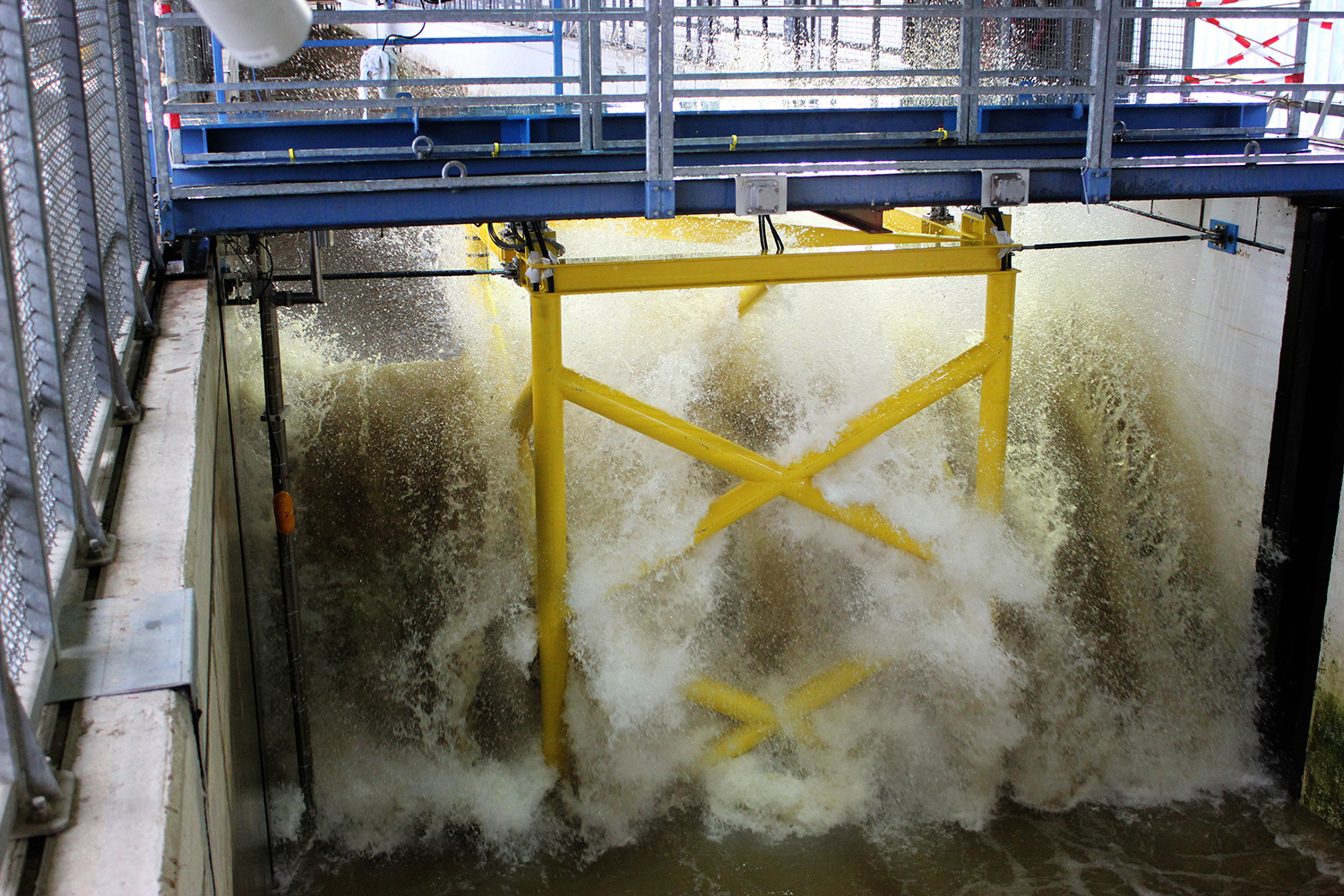EU test facilities join forces to advance the use of marine energy Coastal Research Center (FZK) of Leibniz Universität Hannover and Technische Universität Braunschweig join as German partner institution
Joint press release by Leibniz Universität Hannover and Technische Universität Braunschweig
By networking existing test facilities from all over Europe, a world-leading large-scale research facility for marine renewable energies is to be created. In the MARINERG-i project, research institutions from many European countries have joined forces to advance the development and sustainable use of marine energy, for example through wave or tidal power plants and offshore wind farms. Germany is represented in the network by the Coastal Research Center (FZK), a joint institution of Leibniz Universität Hannover (LUH) and Technische Universität Braunschweig.

A breaking wave on a jacket structure in the Large Wave Flume in Hannover. Photo credit: Coastal Research Center
The project “MARINERG-i – Offshore Renewable Energy Research Infrastructure” aims to become the leading internationally distributed research infrastructure in the field of offshore renewable energy – with a network of unique test facilities spread across Europe. The enormous potential of marine renewable energies is of great importance in the context of the energy transition. Concerted international efforts are needed to make this potential sustainably usable and to take into account the protection of the marine environment in the process. By networking experimental facilities from all over Europe, MARINERG-i will create a so-called “European Research Infrastructure Consortium” (ERIC) as the world’s leading large-scale research facility for marine renewable energies.
MARINERG-i will be instrumental in supporting the EU’s Green Deal by strengthening scientific and technical expertise in Europe. Led by the MaREI Centre at University College Cork, the project is currently supported by Ireland, Belgium, Portugal, Spain and the United Kingdom, with further substantial support from institutions in France, the Netherlands, Italy, Norway and Germany. Germany is represented by Leibniz Universität Hannover and Technische Universität Braunschweig, which are initially offering the use of the newly expanded Large Wave Flume (GWK) at the Coastal Research Center in Hannover. They are also coordinating the future involvement of other German large-scale testing facilities that are interested in participating in a world-leading large-scale research facility in the field of marine renewable energies.
The team is now entering a preparatory phase to define the legal, administrative, scientific and economic components of the European alliance required for the pooled operation of the large-scale research facilities. For a full partnership in an ERIC, final approval from political actors at the federal level is still pending, but the FZK is already intensively involved in the current preparatory phase with great support from the state of Lower Saxony and the German Marine Research Alliance (DAM).
In this way, the Coastal Research Center is making an important contribution to ensuring that Germany keeps up with the currently rapidly developing field of marine renewable energies. Another activity in this direction is the marTech project, funded by the BMWi with around 35 million euros, in which the Large Wave Flume is currently being converted into a globally unique large-scale research infrastructure that offers optimal testing possibilities, especially for the field of marine energy by mapping tidal currents plus ocean waves.
After a successful application phase, MARINERG-i was included in the ESFRI-2021 Roadmap as one of eleven new research infrastructures. The European ESFRI (European Strategy Forum on Research Infrastructures) Roadmap promotes the implementation of major large-scale research facilities for the next ten to twenty years. The roadmap aims to include the best European science facilities, based on a thorough evaluation and selection process. The current roadmap was formally approved in September 2021 and officially announced in December 2021.
Coastal Research Centre (FZK)
The FZK is a joint institution of Leibniz Universität Hannover and Technische Universität Braunschweig, specialising in research in the field of coastal engineering and maritime construction. In association with four partner institutes, the FZK offers numerical and physical models in the fields of hydraulic engineering, coastal protection, marine engineering, geotechnics and soil mechanics. This combined competence and the extensive equipment with in part unique experimental facilities make the FZK a nationally and internationally recognised institution for university research in coastal engineering and maritime construction. With the Large Wave Flume in Hannover, the FZK operates one of the largest research facilities of its kind in the world.
